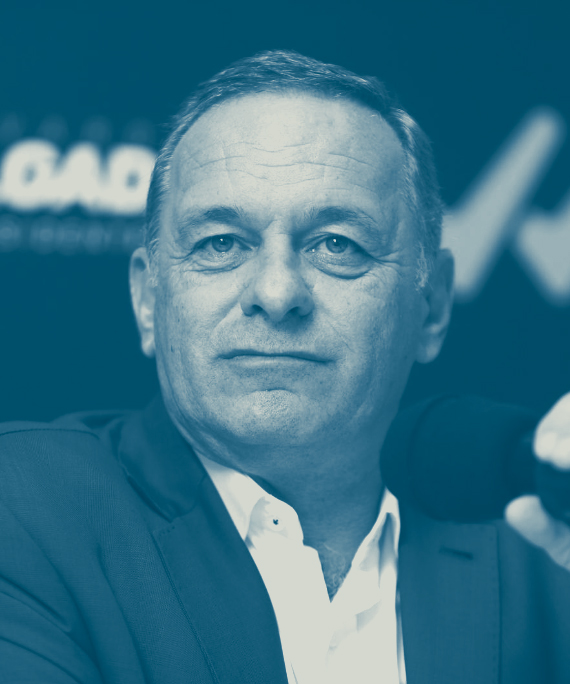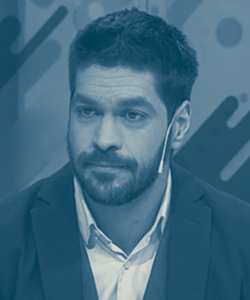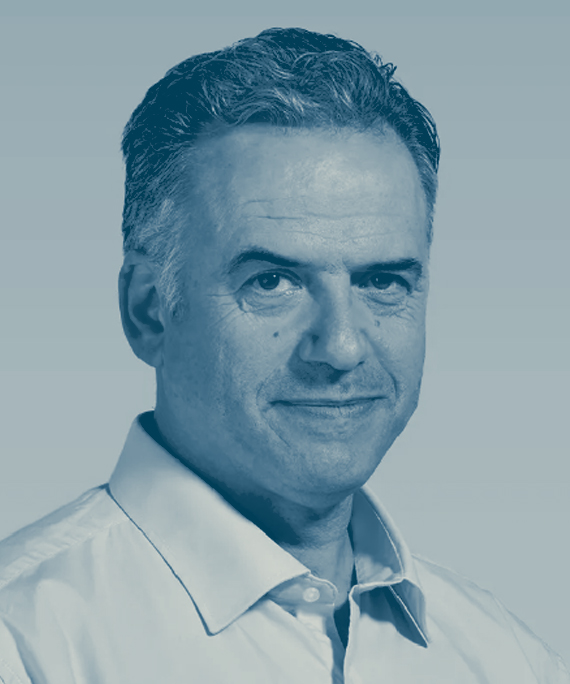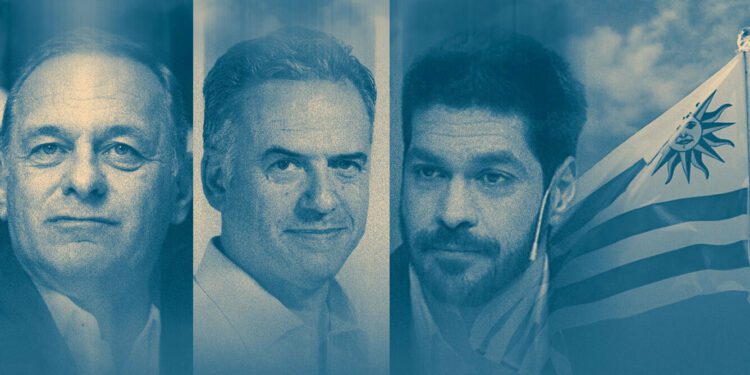UruguayтАЩs presidential candidates weigh prevention with repression to tackle crime.
├Бlvaro DelgadoAndr├йs OjedaYamand├║ Orsi

 PoliciesPoliciesPoliciesMulti-force team inspired by the Italian anti-mafia model to combat organized crime and drug trafficking; border and port protection.Increase the presence of the State and its programs in marginalized neighborhoods and education centers, including prevention schemes and care of children and adolescents with delinquent family members.New government bodies that are dedicated to investigating organized crime, neighborhood crime, border security, and other complex criminal cases.Unify institutions to combat money laundering and implement the Undercover Financial Agent concept.Create new institutions and strategies to combat organized crime and money laundering, decentralize National Secretariat for Anti-Money Laundering, and more power to the Specialized ProsecutorтАЩs Office.Increase transparency in donations and the salaries of politicians, and strengthen anti-money laundering institutions, limit direct appointments.Update regulations and penalties, create a Ministry of Justice and Human Rights, and improve the prison system by allocating a large budget through reform.Decentralize and reform the penitentiary system, train prison officials through competitive examinations, and create a Ministry of Justice and Human Rights.Emphasize social integration and prevention and provide a dignified life for prisoners. Tackle prison overcrowding and prioritize non-custodial measures, create a Ministry of Justice and Human Rights.Supports night raids. Wants to professionalize and strengthen the police force with emphasis on quality of life, mental health and gender violence, improve investigations, police stations, equipment and training; expand the Republican Guard.Supports night raids. Wants tougher penalties, support for law enforcement, strengthen police stations, increase salaries and training, strengthen the Republican Guard and expand technologies, especially to combat cyber crime.Opposed to night raids.
PoliciesPoliciesPoliciesMulti-force team inspired by the Italian anti-mafia model to combat organized crime and drug trafficking; border and port protection.Increase the presence of the State and its programs in marginalized neighborhoods and education centers, including prevention schemes and care of children and adolescents with delinquent family members.New government bodies that are dedicated to investigating organized crime, neighborhood crime, border security, and other complex criminal cases.Unify institutions to combat money laundering and implement the Undercover Financial Agent concept.Create new institutions and strategies to combat organized crime and money laundering, decentralize National Secretariat for Anti-Money Laundering, and more power to the Specialized ProsecutorтАЩs Office.Increase transparency in donations and the salaries of politicians, and strengthen anti-money laundering institutions, limit direct appointments.Update regulations and penalties, create a Ministry of Justice and Human Rights, and improve the prison system by allocating a large budget through reform.Decentralize and reform the penitentiary system, train prison officials through competitive examinations, and create a Ministry of Justice and Human Rights.Emphasize social integration and prevention and provide a dignified life for prisoners. Tackle prison overcrowding and prioritize non-custodial measures, create a Ministry of Justice and Human Rights.Supports night raids. Wants to professionalize and strengthen the police force with emphasis on quality of life, mental health and gender violence, improve investigations, police stations, equipment and training; expand the Republican Guard.Supports night raids. Wants tougher penalties, support for law enforcement, strengthen police stations, increase salaries and training, strengthen the Republican Guard and expand technologies, especially to combat cyber crime.Opposed to night raids.
Wants to have more video surveillance cameras with facial identification systems and the territorial deployment of the Ministry of the Interior (more patrols and personnel).
Strengthen international cooperation, promote urbanization, more technology, more тАЬinternal controlтАЭ.Border protection, Problem Oriented Community Policing (PCOP), victim surveys.Better conditions for police officers (national professionalization plan), university students in police stations.
All three candidates are committed to expanding current policies. They plan to strengthen the Republican Guard, UruguayтАЩs domestic security special force, and enhance police training and equipment. Mental health within the police force is a priority for each candidate, with proposed initiatives to address high suicide rates, along with housing programs, medical checkups, and improvements in mental health services for officers.
Community policing is another focal point. Delgado aims to restructure the community policing model, Ojeda seeks to strengthen problem-oriented community policing, and Orsi wants increased police presence through solutions grounded in тАЬcommunity participation.тАЭ
Emiliano Rojido, a criminology professor at the Universidad de la Rep├║blica, summarized the proposals as тАЬmore budget, more technology тАФ which has become a fetish тАФ more police, more prisons, more sentences.тАЭ
Political scientist and analyst Mauro Casa noted a lack of innovative public policy proposals from the candidates.
Voters have reacted to their plans with тАЬapathy, dissatisfaction, and resignation,тАЭ Casa told InSight Crime.
├Бlvaro Delgado тАУ National Party
├Бlvaro Delgado, the candidate from the ruling National Party, advocates for a tougher, more repressive approach to tackling organized crime.┬а
Originally trained as a veterinarian, DelgadoтАЩs political journey began as a secretary to a popular party figure. He later ascended through the ranks, serving in both houses of parliament and the Labor and Social Security Ministry, before current President Luis Lacalle Pou appointed him┬аchief of staff.
DelgadoтАЩs key proposal is the creation of a Joint Special Group Against Organized Crime and Drug Trafficking, modeled after ItalyтАЩs multi-agency anti-mafia strategy. He backs the contentious approval of night raids, which will be decided in a referendum on election day. Proponents argue the raids are an important tool for catching criminals off guard, while critics warn they heighten the risks to both police and civilians in marginalized neighborhoods. Delgado also wants to toughen penalties for crimes like gang-related homicides and large-scale drug trafficking.┬а
He proposes new laws targeting criminal organizations, introducing new, harsher charges for participating in drug trafficking groups and special protective measures for witnesses and experts in organized crime cases.
UruguayтАЩs incarcerated population has been steadily increasing over the last few administrations
Number of Individuals Incarcerated in Uruguay (2009-April 2024)
October 2024 | Source: UruguayтАЩs Parliamentary Prison Commissioner
In addition, Delgado plans to reform the prison system by promising a тАЬsignificant budget increase,тАЭ the creation of a new ministry, and improved coordination between state agencies.┬а
To combat financial crimes, he advocates merging the National Secretariat for Anti-Money Laundering (Lavado de Activos y el Financiamiento del Terrorismo тАУ Senaclaft) and the Financial Information and Analysis Unit (Unidad de Informaci├│n y An├бlisis Financiero тАУ UIAF), alongside employing undercover financial agents.
His security strategy aims to bolster UruguayтАЩs fight against organized crime on all fronts and extends to strengthening border and port defenses, enhancing international police cooperation, and promoting urban development as a crime prevention measure.┬а
Andr├йs Ojeda тАУ Colorado Party
OjedaтАЩs platform focuses heavily on crime prevention and reinforcing police actions within the framework of the law.
A lawyer by trade, Ojeda rose to media prominence through his work on high-profile cases and as the legal representative for the police union. His political career includes serving as a councilor in Montevideo for the Colorado Party from 2010 to 2015, and advising other politicians on security matters.
His program emphasizes prevention, proposing community ties through security and coexistence committees, enhancing school safety with technology and community policing, integrating crime prevention into curricula, conducting victimization surveys, and establishing rehabilitation centers and special programs for children and adolescents affected by family crime involvement.
тАЬThere are nods to the center. Actors have learned that if you donтАЩt address the root causes of crime, thereтАЩs no way to stop it,тАЭ Casa said, reflecting on the shift towards preventive strategies even in right-wing harder-line policies.
In the battle against organized crime, Ojeda plans to develop a National Security Audit with the support of the United Nations Office on Drugs and Crime (UNODC), identifying vulnerabilities and creating a National Strategy Against Organized Crime. Like Delgado, Ojeda backs night raids as part of his plan.
On the issue of money laundering, Ojeda advocates decentralizing Senaclaft and establishing the General Directorate for Combating Money Laundering within the National PoliceтАЩs Investigations Division. He also seeks to strengthen ties with Interpol and the US Drug Enforcement Administration.
SEE ALSO:Uruguay Corruption in Spotlight After Ex-OfficialтАЩs Release From Prison
His prison reform plan includes gradually transferring inmates to a larger number of smaller, more manageable facilities. He also aims to significantly increase human resources in the prison system, ensure universal healthcare, and develop alternatives to imprisonment.
The Colorado Party is divided between conflicting approaches to crime, however. Within OjedaтАЩs team, tensions have emerged as the hardline, punitive stance championed by former prosecutor Gustavo Zub├нa clashes with the more prevention-oriented strategy proposed by criminologist Diego Sanjurjo, a security policy specialist working in the interior ministry. The return of former Senator Pedro Bordaberry, bringing his own vision to the table, has only deepened these divisions, causing rifts not only within the party itself but also across the broader coalition.
Yamand├║ Orsi тАУ Broad Front
Yamand├║ Orsi, the most left-leaning candidate, centers his security plan on expanding state capacity to combat crime.┬а
A former history teacher and member of the Popular Participation Movement (Movimiento de Participaci├│n Popular тАУ MPP) within the leftist Broad Front coalition, Orsi has been framed as a political successor to former President Jos├й Mujica, who took a progressive approach against organized crime, legalizing marijana and building houses for low-income families.
His platform is built on three pillars: economic stability and growth, social protection, and enhanced security. The Broad Front attributes rising crime to social inequality and systemic economic failures, arguing that lack of personal development and income-generating opportunities leads young people to crime, violence, and drug trafficking.
However, a development-focused approach to combating organized crime proved ineffective during the previous Broad Front administration, according to Rojido. тАЬUruguay saw general improvements in social and economic indicators during the left-wing governments, but there was also a significant increase in violence and crime.тАЭ
Despite some improvements, homicides remained high under the last two administrations
Homicides in Uruguay (2013-2023)
October 2024 | Source: UruguayтАЩs National Observatory of Violence and Criminality
To go beyond social development, Orsi promises to bolster the stateтАЩs presence and invest heavily in organized crime-fighting resources. This includes ramping up surveillance with more cameras, using facial recognition, and deploying interior ministry forces across Uruguay.
Reflecting the Broad FrontтАЩs shift toward centrist and tougher stances on crime, Orsi proposes new institutions to investigate organized crime, drug trafficking, border security, and complex cases. Like his rivals, he seeks to strengthen money laundering investigations but adds a focus on transparency in political donations, which could reveal corruption or criminal influence in campaigns.
The Broad Front тАЬhas shifted toward the center and a hardline approach, a paradigm shift for the left, associated with the years the FA was in government,тАЭ according to Casa.
Featured Image: ├Бlvaro Delgado from the National Party, Yamand├║ Orsi from the Broad Front and Andr├йs Ojeda from the Colorado Party are the front-runners in this monthтАЩs presidential election in Uruguay.
Source link : http://www.bing.com/news/apiclick.aspx?ref=FexRss&aid=&tid=671a8e33ba5d494cb215963ab9f5f89b&url=https%3A%2F%2Finsightcrime.org%2Fnews%2Fcrime-drugs-violence-top-concerns-uruguay-elections%2F&c=17842725519847591356&mkt=en-us
Author :
Publish date : 2024-10-24 05:29:00
Copyright for syndicated content belongs to the linked Source.










